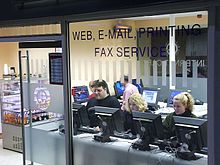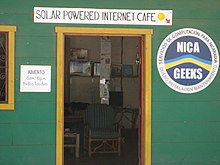Cyber coffee
A cybercafé (from cyber- and café), cybercafé, internet café or simply ciber, is a public place where customers are offered access to the Internet and, although not all of them, also cafeteria, bar or restaurant services. For this, the premises have computers and usually charge a fixed fee for a determined period for the use of said equipment, including access to the Internet and various programs, such as word processors, graphic editing programs, CD or DVD copying., etc. There are also some internet cafes that don't necessarily sell any of those cafeteria items. Internet cafes have contributed considerably to the massification of the Internet, especially in communities with low purchasing power. They were very popular in the late 1990s and throughout the 2000s.
Generally, when only Internet access is offered through computer equipment, they are known as browsing center or browsing room. Informally they are also known as locutorio (in Argentina and Spain), telecentro (in the Dominican Republic), internet center (in Colombia, pronounced /síber/) cyber (in Venezuela, pronounced /sáiber/) and Cyber (in Ecuador).
History
The first internet cafes were opened in London, England in 1994. The first cafe was Café Cyberia, which opened its doors in September 1994. Its founder, Eva Pascoe, says the idea came to her from early 1990s, when he spent a lot of time away from his family working on his doctoral thesis. In those days, she was one of the few people who had access to an email account, a purely academic service in those days; but with no one else in her family having an email address, she had to spend considerable amounts of money on phone bills.
Sitting in a cafe near her school one day, she thought it might be fun to be able to go there with her laptop and send emails while taking a break from her usual routine. She took a look around her and was able to recognize some friends that she knew had Internet connections from her house. Later, talking to them, she thought about what it would be like to have a permanent connection to the Internet from a cafe and pay a small fee to be able to exchange messages with her friends and family, send mail and have instant messaging. Three months later, in September, they opened the first Internet cafe in London. From that moment until today, Internet cafes have multiplied throughout the world.
The Internet cafe as a business
Already well into the first decade of the XXI century, thanks to the massification of the Internet in many countries in which they participated Internet cafes became very popular businesses. However, the oversupply, unfair competition and falling prices, the energy consumption of computers have caused the sector to suffer a major crisis, which is why many businesses have been forced to close.
Another circumstance that has put Internet cafes in the crosshairs of the authorities is the increase in computer crimes carried out from these public access sites, where user control is difficult. In addition, with free access to pornographic pages without having adequate filters for minors, the trend of private cabins has been imposed, which further encourages access to these pages.
In some countries like Turkey, Cuba, China or Saudi Arabia, Internet cafes are heavily regulated to prevent their citizens from communicating freely and accessing information from abroad without restrictions. The application of strict filters is forced and government censorship controls are carried out.
The massification of residential Internet service has diminished the existence of this type of premises, causing its gradual decline.
Types of Internet Cafes
Depending on the location and the associated clientele, several types of Internet cafes can be distinguished. Each of them requires a different computer equipment, as well as a different level of maintenance and knowledge to be able to manage it.
Focused towards the game
This type of cyber room is characterized by a young clientele who come to play online with other players (usually acquaintances or friends) or alone (play on the computer). They ask for powerful computers, due to the demands of modern games, and a greater renewal of equipment, since new games that need more power or graphic quality are constantly coming onto the market. They allow constant innovation in techniques.
Focused on Internet use
They have computers to surf the Internet in a generally calm and relaxed environment.
The computers do not have to be as powerful as in the previous case, but they must be properly configured to prevent their misuse, such as the installation of programs that could cause damage to the computer.
It is recommended not to connect more than eight web cameras for video conferencing use. If you want good quality, it is necessary to contract ADSL of at least 2 Mbps. If you exceed the number of eight people using videoconference, since a large part of the upload bandwidth is occupied by all Internet accesses and the loading of pages web will become slow.
This type of place orients the business to a university public or foreigners. It is the ideal complement to call shops, since both compete for the same target audience. Computers are cheaper and it allows a less qualified person to run the internet cafe.
This type of cyber room is replacing arcades, where young people meet, which is usually the public that wears out the most computer equipment.
The highest possible level of protection is recommended.
Due to the mass use of residential Internet service, there has been a considerable decrease in users of this type of premises, which means that they decrease to the point of almost disappearing gradually.
Users
Today, the biggest users of Internet cafes are young people who usually gather in them to access online video games. They are also frequented by people who have controlled access to the Internet at work and have no alternatives to consult at home, by students and parents who require advice on information searches, by travelers who find in Internet cafes the possibility of having a way to communicate with your family and friends and for any other person who requires access to the Internet and its services quickly and cheaply.
In some countries, internet cafes bring together communities of friends on weekend nights, as a leisure alternative to drinking alcohol, since their liberal hours tend to last until late at night.
With the great rise of the so-called social networks, the use of these establishments has been increasing, even by those people who did not use the Internet before, taking advantage of the tools they have, such as being able to send and receive images, videos, chat service, even receive news generated at the moment.
Coffee in internet cafes
Although in many countries the concept of coffee itself is not constant, there are still many of these businesses that allow the sale and consumption of food and drink, including coffee. Perhaps the name of coffee is associated with the old cafes, where people met to exchange opinions with their friends and acquaintances, and as such it is just a natural evolution favored by technology. Many internet cafes are called that even though they don't sell any food or drinks.
Management Software
For the administration and control of a cybercafé you can find software free[citation required] or commercial, which allows you to manage, Manage usage time, manage product stock, lock equipment, and manage accounting. It also allows you to keep a database of customers who attend most frequently, receiving benefits for each promotion and doing loyalty marketing.
Contenido relacionado
Carreno's Manual
Wikipedia:Public domain images
Cartoon in Argentina


